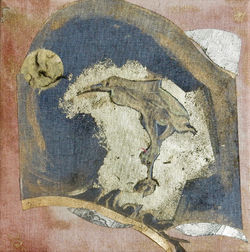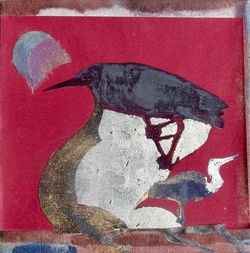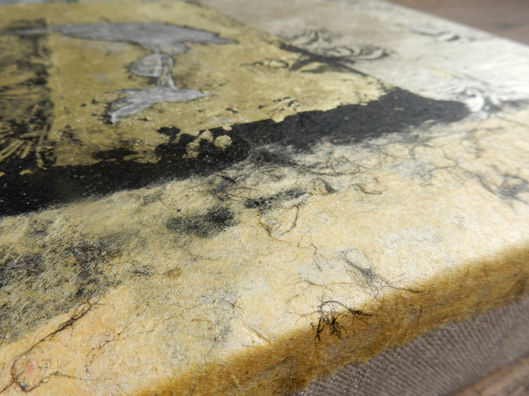ARTIST: Chertoff
Chertoff studied at Pratt developing a special process of layering handmade dyed natural papers with her drawings and gold leaf. She describes these assemblages as 'tapestries,' works that can weave light and fiber.
 Avian Odyssey IV10" h x 10" w original mixed medium with gold leaf on canvas |  Avian Odyssey VIII10" h x 10" w original mixed medium with gold leaf on canvas |  Migratory Moment VII10" h x 10" w original mixed medium with gold leaf on canvas |
|---|---|---|
 Migratory Moment VIII10" h x 10" w original mixed medium with gold leaf on canvas |
The Artist's Process
-
The fiber Kozo is processed by hand cooked in a caustic soda to release impurities in the fiber
-
Abaca, a banana leaf fiber, is put in a large beater and beaten
-
Both fibers are dyed and pigmented
-
Next, a fiberglass screen is cut to an exact dimension
-
A chemical formation aid is added to the colored pulp fiber
-
Colors are mixed in 5-gallon buckets
-
The fiberglass screen is put on top of another screen
-
Pulp is diluted and poured in layers for the desired color and or texture
-
Next, the images such as the birds are original and hand-drawn
-
They are cut out with a backing of heat-sensitive paper
-
The images are rolled by hand with an ink
-
The images are gilded with 23 Karat gold
-
The images are drawn through the gold to create contour and texture
-
The images are arranged on the fiberglass screen
-
The images are heat activated and are glued to the fiberglass surface
-
Layers of thin pulp are integrated into the design creating depth and mystery
-
The work is sealed and protected



